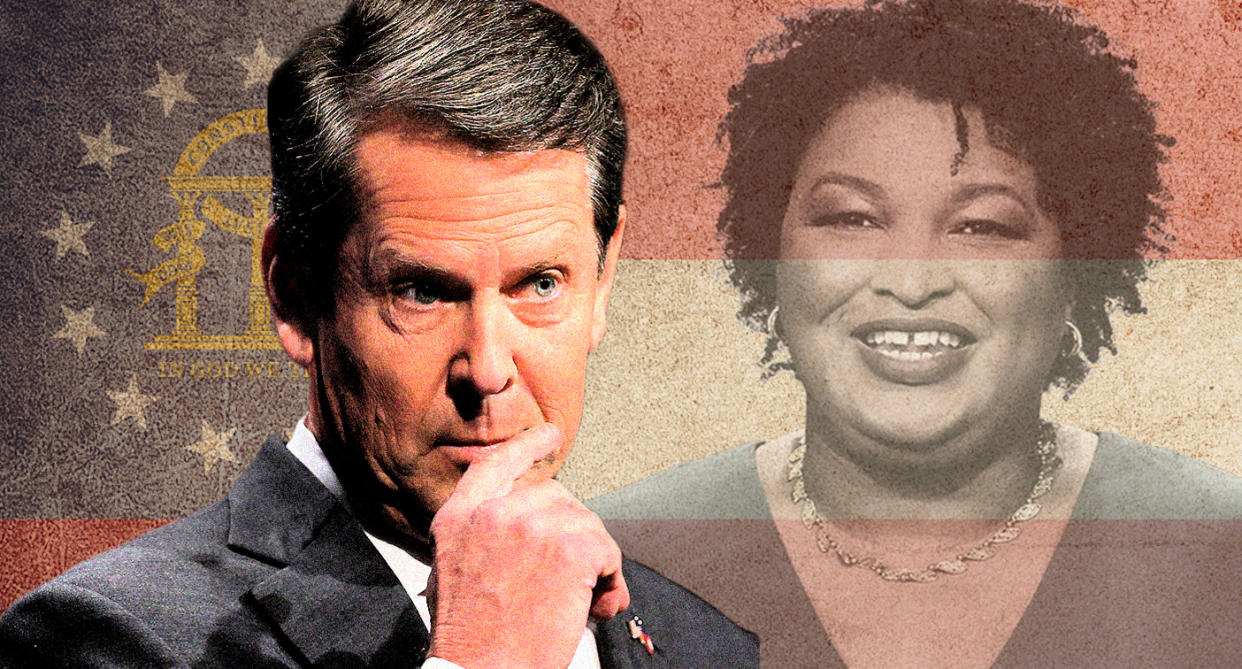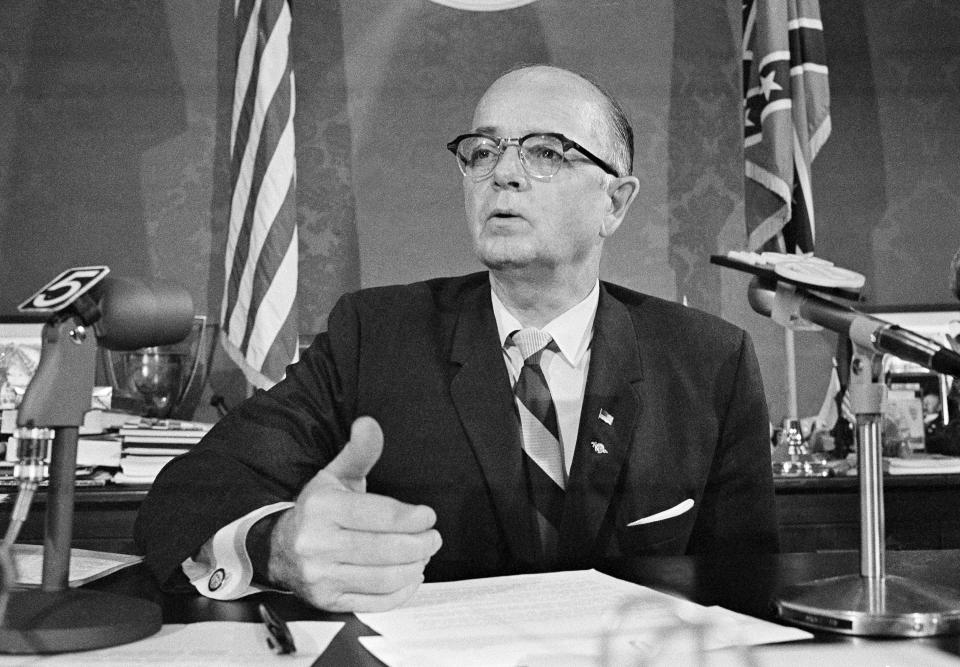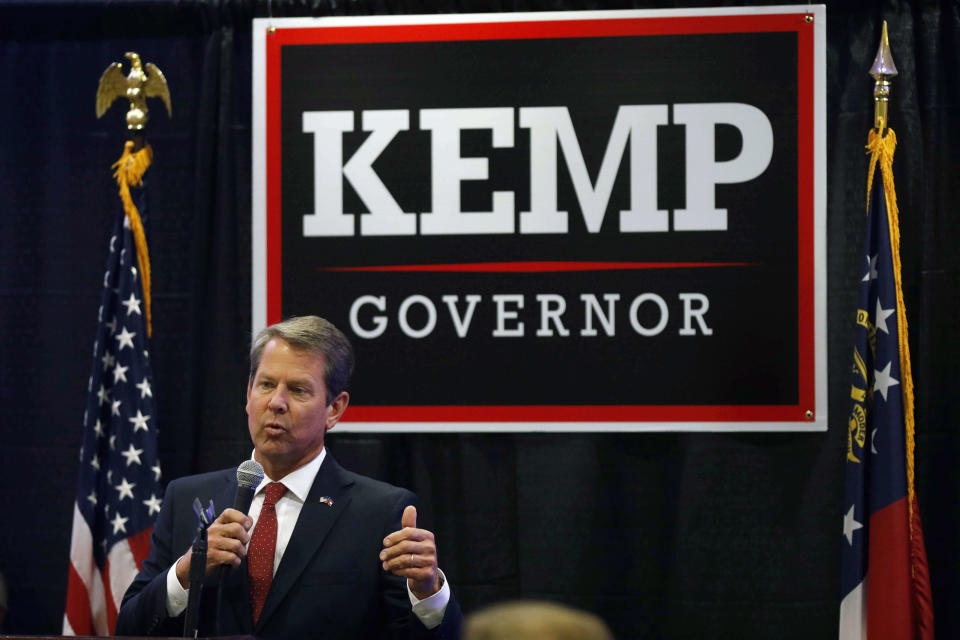'Outside agitators,' a phrase from the civil rights era, resurfaces in Georgia governor's race

WASHINGTON — It’s happening again in Georgia.
There’s another election in which Republican Brian Kemp is being accused of using arcane and complicated procedures to prevent Georgians of color from voting, with Democrat Stacey Abrams leading the effort to push back. It also happened in 2014, but this time, Kemp and Abrams are running against one another for governor in a closely watched race with national implications.
In a state that has overwhelmingly voted Republican in recent years, polls show a dead heat with a month to go.
It’s an epic confrontation that has been building for years.
And on Wednesday, in response to the latest accusation that Kemp — who is running in an election he will oversee as secretary of state and rejecting calls to resign from that office — has blocked 53,000 Georgians from registering to vote, the Republican issued a statement that included one particularly noteworthy phrase.
“Despite what you hear or read, the numbers are clear. While outside agitators disparage this office and falsely attack us, we have kept our heads down and remained focused on ensuring secure, accessible, and fair elections for all voters,” Kemp said in a statement through his state office website.
Kemp also announced that voter registration in the state had hit a record high of 6,915,000. “The fact is that it has never been easier to register to vote and get engaged in the electoral process in Georgia, and we are incredibly proud to report this new record,” Kemp said.
It was Kemp’s use of the term “outside agitators” that caught the attention of some historians in the state.
“Brian Kemp refers to his critics as ‘outside agitators.’ You can’t make this stuff up!” tweeted Joseph Crespino, professor of 20th century U.S. history and chair of the history department at Emory University in Atlanta.
Brian Kemp refers to his critics as “outside agitators.” You can’t make this stuff up! https://t.co/jw5p2OK2SC
— Joe Crespino (@CrespinoJoe) October 11, 2018
Crespino told Yahoo News in an interview that the term is heavily freighted with racially charged meaning, dating to its use by pro-segregation leaders during the civil rights movement.
“The term ‘outside agitators’ has a long and complicated history in Southern politics. It was first used by opponents of labor unions back in the 1930s and ’40s, but it was quickly also applied to any kinds of groups that were advocating for greater civil rights and legal protections for African-Americans,” Crespino said. “So it became common from 1930s and ’40s onward for Southern politicians to label anybody who wanted to change the status quo in Southern politics as ‘outside agitators’ and to dismiss movements for civil rights as being instigated by people from the outside.”
The term “is about marking certain people and political positions and claims as foreign,” said Jason Morgan Ward, also a history professor at Emory.
The idea of outsiders is a key part of the case Kemp is making against Abrams, citing the millions of dollars in campaign contributions to her from outside the state, and arguing that her policy positions are more in line with national Democrats than they are with Georgia voters.

But the term is freighted with history as a tool of discrediting civil rights leaders.
Martin Luther King Jr. referred to the usage in his famous “Letter From Birmingham Jail” as an example of the way that opponents of civil rights would try to discredit him and others in the movement.
“If our white brothers dismiss as ‘rabble rousers’ and ‘outside agitators’ those of us who employ nonviolent direct action, and if they refuse to support our nonviolent efforts, millions of Negroes will, out of frustration and despair, seek solace and security in black nationalist ideologies — a development that would inevitably lead to a frightening racial nightmare,” King wrote from a jail cell in 1963.
One of Georgia’s most famous white supremacists, the late Gov. Lester Maddox, often used the term “agitators” to dismiss those who protested his refusal to serve three African-American Georgia Tech students at his restaurant in Atlanta. Maddox’s account of the 1964 confrontation, after the enactment of the federal Civil Rights Act, included multiple reference to “agitators.”

Maddox was elected governor in 1966 on the strength of his fame for standing up against civil rights.
Rep. John Lewis, D-Ga. — who marched and organized alongside King — recounted his confrontation with a sheriff in Selma, Ala., during the 1965 campaign to register African-Americans to vote: “On January 18, it was my day to lead the people down to the Dallas County courthouse to try to register to vote. Sheriff Clark met me at the top of the steps. ‘John Lewis, you’re an outside agitator. You’re a troublemaker,’ Clark said.
“‘Sheriff, I may be an agitator, but I’m not an outsider,’ I said. ‘I grew up only 50 miles from here, and I’m going to stay here until these people are allowed to register and vote.’”
Kemp did not respond to requests for comment about what informed his use of the term “outside agitators.” His official state and campaign press spokespeople did not return phone calls.
Crespino said he was “surprised that the use [of the term ‘outside agitators’] would be so blatant.”
“There are only two scenarios here. Either this is just a term that is in the back of [Kemp’s] mind and he doesn’t think about it. That’s unfortunate because it means he’s ignorant — that Brian Kemp doesn’t understand the long history of this term and how it’s been used,” Crespino said. “I think, given the way Brian Kemp ran his campaign in the primaries, that he used it with every intention and that he knew the kind of way that term resonates.”
Crespino was referring to a primary campaign that Kemp’s Republican opponent, Lt. Gov. Casey Cagle, said was a contest to see “who had the biggest gun, who had the biggest truck, and who could be the craziest.”
Cagle was describing Kemp’s TV ads, including one in which Kemp announced: “I’m so conservative I blow up government spending,” as a huge fireball erupted over his shoulder. In the next scene, Kemp stood with seven long guns and several handguns, cocked a pump-action shotgun, and said, “I own guns that no one’s taking away.”
Posing with a pickup, Kemp boasted, “I got a big truck, just in case I need to round up criminal illegals and take them home myself.”
Kemp reveled in the outrage his ad would provoke from some. “Yep, I just said that,” he cracked at the end of the ad. “If you want a politically incorrect conservative, that’s me.”
But Kemp may be having more of an impact on the election through his aggressive use of state powers to remove voters from the rolls, including his controversial “exact match” policy, which disqualifies registrants based on minor errors in spelling or even punctuation. In previous elections, he has sent armed officers to a county where a school board flipped from majority white to majority black and investigated the New Georgia Project, which Abrams — then the minority leader in the Georgia House — founded in 2013 to register more minority voters.
The Associated Press reported this week that its investigation found that “through a process that Kemp calls voter roll maintenance and his opponents call voter roll purges, Kemp’s office has canceled over 1.4 million voter registrations since 2012” and that “nearly 670,000 registrations were canceled in 2017 alone.”
The AP report found that 70 percent of the 53,000 voters whose registrations were flagged as inconsistent with records at the state’s Department of Driver Services or with those on file at the Social Security Administration were African-American. The state’s population is 32 percent black.

In the wake of the AP investigation, Abrams has called on Kemp to resign his position as secretary of state, arguing it is a conflict of interest for him to oversee an election for the highest office in the state in which he is also a candidate.
Kemp has been an overt partisan even while serving as the state’s protector of electoral integrity. In 2014, he warned Republicans at a Gwinnett County meeting that Democrats were trying to increase voter registration by minority voters. Kemp said this was a threat to Republicans, and exhorted his party to fight back by registering more of its own voters.
“The Democrats are working hard, and all these stories about them — you know, registering all these minority voters that are out there and others that are sitting on the sidelines — if they can do that, they can win these elections in November. But we’ve got to do the exact same thing,” he said.
Crespino said the stakes feel high. “This is a historic election. It does feel weighty,” he said. “This is a test for Georgian voters to see whether there are folks in the middle who will stand up and say this is not right … that a secretary of state with the track record of Brian Kemp, being called out in the way that he is for very shady practices, it seems like a very reasonable moderate position to take to ask him to step down when he’s one of the two candidates in the race. This is not complicated.”
_____
Read more from Yahoo News:



